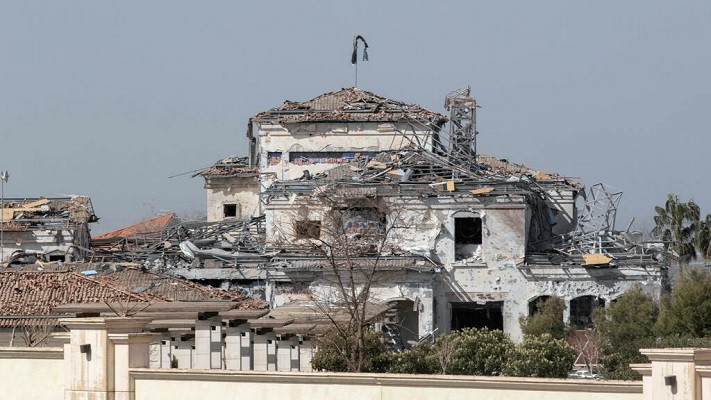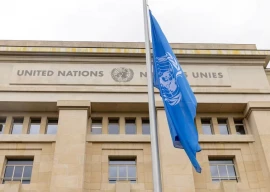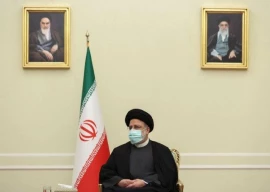
Iran claimed responsibility for a missile strike Sunday on the northern Iraqi city of Arbil, saying it targeted an Israeli "strategic centre".
Authorities in Iraq's autonomous Kurdish region had earlier said 12 ballistic missiles rained down on Arbil in a pre-dawn attack targeting US interests that slightly wounded two civilians and caused material damage.
The missiles came from beyond Iraq's eastern border, Kurdistan's counter-terrorism unit announced -- in effect saying they were fired from Iran, a nation that wields considerable political and economic influence over Baghdad.
Iran's Revolutionary Guards later confirmed they fired the projectiles, claiming they were targeting sites used by Israel, a top ally of the US.
A "strategic centre for conspiracy and mischiefs of the Zionists was targeted by powerful precision missiles fired by the Islamic Revolutionary Guards Corps", the Guards said in a statement.
Sunday's assault comes nearly a week after the Guards -- Iran's ideological army -- vowed to avenge the death of two of their officers killed in a rocket attack in Syria they blamed on Israel. Iran backs the government in Syria's civil war.
Israel, the Guards said at the time, "will pay for this crime".
There was no immediate reaction from Israel to Sunday's missile attack and Kurdish authorities insisted that the Jewish state has no sites in or anywhere near Arbil.
Kurdish authorities said the target of the attack was the Arbil consulate of the United States.
'Baseless allegations'
Arbil governor Oumid Khouchnaw told a news conference that two people, a taxi driver and a the custodian of a farm, were injured.
Speaking before Iran claimed the attack, he dismissed however as "baseless allegations" the presence of Israeli sites in and around Arbil.
"We've been hearing for sometime that Israeli sites are present. These are baseless allegations. There are no Israeli sites in the region," Khouchnaw said.
He said the missiles fell into vacant lots but that buildings and homes were damaged.
The interior ministry in Arbil said a "new building" housing the US consulate in a residential suburb of the city was the target of the attack.
Read More :'US working to help Iraq get missile defence capabilities'
Washington, a foe of Iran with troops on the ground in Iraq, said there was "no damage or casualties at any US government facility".
"We condemn this outrageous attack and display of violence," a State Department spokesperson said.
Taxi driver Ziryan Wazir said he was in his car when the missiles struck.
"I saw a lot of dust, then I heard a very loud noise. The windows of my car exploded and I was injured in the face," he said, his head swathed in white gauze and a bloodied scar running the length of his cheek.
Local television channel Kurdistan24, located near the US consulate, posted images on social networks of its damaged offices, with collapsed sections of false ceiling and broken glass.
An AFP correspondent in Arbil said he heard three explosions before dawn.
Regional tensions
Iraq, including the Kurdistan region, is home to a dwindling number of US troops who led a coalition fighting the Islamic State group.
Washington has routinely blamed rocket and drone attacks against its interests in Iraq on pro-Iran groups who demand the departure of the remaining troops.
But cross-border missile fire is rare.
Masrour Barzani, prime minister of Iraqi Kurdistan, decried the "terrorist attack" in Arbil, and appealed for calm.
Iraq saw a surge in rocket and armed-drone attacks at the beginning of the year.
It coincided with the second anniversary of the killing of Iranian General Qassem Soleimani in a US drone srike near Baghdad airport.
Soleimani, killed alongside his Iraqi lieutenant Abu Mahdi al-Muhandis, headed the Quds Force, the Revolutionary Guards' foreign operations arm.
In late January, six rockets were fired at Baghdad International Airport, causing no casualties.
Iran itself responded to the January 2020 killing of Soleimani by firing missiles at military bases in Iraq housing US forces.
Sunday's assault also comes amid a pause in negotiations between Iran and world powers to revive its 2015 nuclear deal.
Negotiators in Vienna said Friday they halted the talks despite having almost sealed a deal to revive that accord.
The setback came after Russia said it was demanding guarantees that the Western sanctions imposed on its own economy amid the conflict in Ukraine would not affect its trade with Iran.


1731550446-0/Polymarket-(1)1731550446-0-165x106.webp)

1729512368-0/liam-(8)1729512368-0-165x106.webp)















COMMENTS
Comments are moderated and generally will be posted if they are on-topic and not abusive.
For more information, please see our Comments FAQ